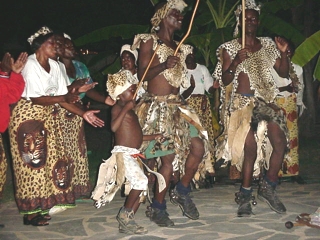|
Ngoni People, the Zambezi River:It was an African afternoon in November. The year was 1835. Scores of women, children and elderly Ngoni people drowned while attempting to cross the Zambezi River. The people were led by their chief Mpezeni. And as for the crocodiles? It was a field day, a great feast! Then suddenly the sun darkened and the sky became night. Why? The moon’s shadow had just covered the sun. It was the solar eclipse of November 19, 1835. It’s as if it marked the crossing of the Zambezi River by the Ngoni people. But they were frightened. They thought the gods were angry with them for the plunder they had committed along the way from South Africa. Now the Ngoni people were a fierce tribe. In the 1800’s they raided people they found along their route. Theirs was not an ordinary trip northwards. They were on the run. His Royal Highness King of the Zulu Shaka with his impis (soldiers) was in pursuit. The 1800s was a period of much strives and tribal wars in Southern Africa. As usual land and domestic animals was cause. The Ngoni is a sub group of the Zulu people of Shaka. They were escaping persecution from the legendary King Shaka of the Zulu in Kwa-Zulu Natal in South Africa. They passed through Swaziland and Zimbabwe. They crossed the Zambezi River at the confluence with Luangwa River at a place called Zumbo. This is where it happened. The drowning and all… During the procession that lasted many years the Ngoni lost their language and some of their traditions. They left their wives behind and married from the tribes they conquered along the way. Their children learnt their mothers’ tongues, not the Zulu language of their fathers. After traveling to up Tanzania they turned round southwards and settle near Chipata in Eastern Province of Zambia. Another group settled in neighbouring Malawi. At Luwangeni, the Chief Mpezeni’s village, the Ngoni people lost their first battle. But why? The white man had arrived. With the superior weapon, the gun, the Ngoni were no match to them. So it remained to Nsingo, Chief Mpezeni’s first son and crown prince. He offered himself to be killed together with his wife as sacrifice to end the war. He would have become Mpezeni II. The current Mpezeni is the forth.
The Ngoni people are settled in the Eastern Province of Zambia. Despite losing some customs they have continued to maintain some of their rich cultural heritage. The Nc'wala Ceremony one of Zambia’s traditional ceremonies was not lost. Nc’wala is a royal dance. It’s held at the end of February each year to celebrate the first fruits of the harvest. The first crops from the gardens are presented to the chief to taste. This is called Maswela and is done before the actual ceremony.
Zambia African Safari © ZAS 2004
|



